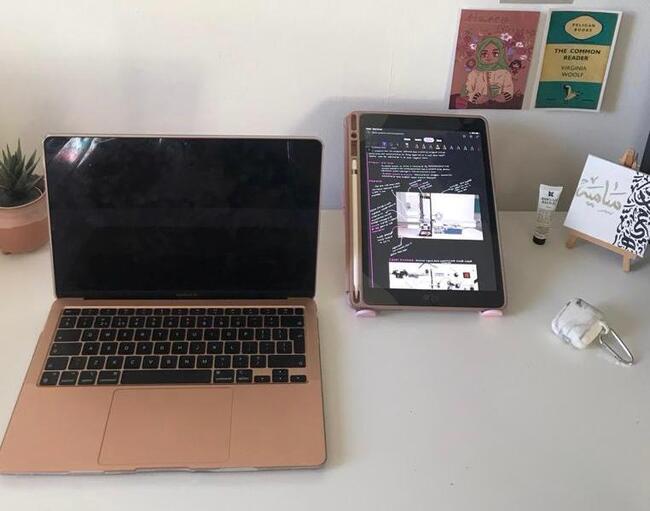|
There are lots of ways to study, some highly effective, others less so. The book How We Learn advocates spacing out study sessions, whereby the same topic is focused on for a short period of time spanned over a few days.¹ It might feel like a bit of a challenge at the beginning, but by gradually re-acquiring knowledge through flashcards and self quizzes one’s learning can become long-lasting.² We have put together the UCL Weebly Blog team’s own accounts of our study methods in this entry. We have covered some ways that have proven to be effective in our studies, such as the Pomodoro time management technique, recording oneself reading aloud lecture notes, actively recalling by answering self-test questions and understanding the context of assignments to actively engage with the learning. We hope this entry can be helpful with your studies, especially as the exam seasons are coming up and we wish you all the best of luck!
I’m Samia: a first-year student in the MPharm degree. As someone who is at the start of my university life, I’ve had to adapt to the various forms of learning that have been exposed to me since starting. One significant change is the structure (or rather, lack of) at university; rather than having a set routine to follow each day, the timetable is constantly changing, meaning that I need to be able to mould my study methods around the different lab classes and workshops that I need to attend. Firstly, before I begin studying - it is important for me to set out my intentions for the day - this could be in the form of a simple to-do list or a more comprehensive schedule. Personally, I like to create a daily time-blocked schedule: this allows me to understand exactly what tasks I need to complete whilst also allowing me to schedule time for my hobbies. The main way in which I study effectively is by constantly implementing the concept of active recall when learning a new concept. Rather than making countless notes, my learning process involves three simple steps - understand, question and recall. Initially, I prioritise trying to completely understand a topic - by engaging with a lecture through annotating the lecture notes - as I go along the lecture slides, I create concise recall questions. Once I have finished studying a topic, I answer the recall questions - thus allowing myself to actively recall whilst also being able to immediately identify the gaps in my knowledge. Although this is my method of learning, the concept of actively recalling a topic can come in many forms and can be personalised to each individual. Furthermore, managing stress and maintaining a healthy work-life balance is crucial to the process of studying. Although these factors are often forgotten about, not prioritising your mental health can lead to ‘burn-out’ and negative mental health. One way that I maintain a healthy work balance is by ensuring that there is a specified time during the week which is purely dedicated to my hobbies - whether that be reading a new book, visiting a new café or going on a walk. As someone who is susceptible to getting ‘burn-out’ from overworking myself, I also prioritise having a consistent healthy sleep schedule, by creating an evening routine - this routine allows me to spend the last few hours of my day in a state of calm by relaxing and therefore, recharging myself for the next day. Overall, I have established that having a study schedule is as vital as maintaining a good balance between study and life, thus allowing a student to prosper whilst being in a positive state of mind. I’m Alex and I’m currently in the second year of the MPharm degree. Learning in the second year involves understanding the fundamental scientific knowledge that underlies common diseases and its application. This application of knowledge is delivered through the chemistry and pharmacy practice modules. My process of learning is to skim through lectures during term time, because most of the time I would be busy dealing with coursework, assignments, laboratory classes and extra-curricular activities; then during the breaks is when I can devote most of the time drilling into topics. One way I find which helps in understanding the factual topics is to read the lecture notes aloud and record myself. It is with reading out loud and involving the two senses of sight and hearing, that I can actively recall what I have learnt from lectures and fill any gaps in my knowledge. Recording myself may seem silly, but it does serve one essential purpose, which is to conveniently pack what I learnt into an easily accessible form. For practical topics, making mistakes is key for me. I allow myself to make mistakes as it helps me to identify my logical flaws and fix any misunderstandings I have about the topics. I am constantly aware of the time involved in this entire learning process and I must admit that I am more than frequently burnt out. I have tried various time management methods but most of them did not work for me. One method which suits me well is to exercise and have entertainment before studying or revising. I then find myself in the mood for studying! I’m Anika, a third year student in the MPharm degree. Being a third year, the most important thing is to be aware of deadlines and managing time efficiently. Not only is this crucial during term time but it is also crucial during the exam season. When preparing for your exams, have a clear structure of what you need to get done. Break this down very clearly into weekly and daily activities to ensure you go through all the material in manageable bitesize chunks. Be as realistic as possible with your daily tasks. I cannot stress this enough - none of us are robots or instant-energy-machines - we cannot possibly focus for a full 24 hours, so be kind. Prioritise the content you struggle with most and more importantly, allocate breaks. One way to do this is through the Pomodoro technique - work for 30 minutes, have a break for 5 minutes, and repeat. Try to get into a good routine, waking up, starting work, having lunch and sleeping at particular times. This helps to motivate and programme your brain to associate certain times of day with particular activities in order to build them into habit. There may be days when you want to sleep in or you struggle to work and that is okay, because whilst it is important to study smart and implement good habits, at the same time it is equally, if not more important to look after yourself as we near exam season. Dedicate time for yourself and build this into your work schedule, whether that be 30 to 60 minutes, or longer, of re-watching your favourite TV series, meeting your friends or continuing that creative project you’ve been meaning to. It is essential, for your wellbeing and to prevent burnout, to focus completely on something you enjoy, besides work. Hope that helps! I’m Sara, and I am currently in my fourth and final year of the MPharm degree. If there was one tip I could share it would be to never give up and to always aim to be your best self, no matter which stage of the course you are at. I noticed that particularly in Year 3, paying attention to the lecturer’s advice and then thinking about what I really wanted to achieve from each assignment helped to put me on the right track. The main difference between fourth year and the previous years of the programme is that this year we are expected to work on most coursework on our own and to use our fundamental knowledge to integrate the different disciplines within pharmacy. We also had the entire Term 1 to spend on our Masters’ research project, so taking responsibility for our work, planning and time management were key. At times, I almost regretted choosing a specific topic for my pharmacology project and some days, identifying the ‘‘right’’ studies and statistical tests to include in the meta-analysis seemed like an insurmountable challenge. However, by asking my supervisor and peers for help and also looking up the concepts or tests I was unsure about allowed me to put everything into context and to exclude information that was likely to confuse the reader. We had experience of writing essays to critically analyse a topic as well as creating and presenting posters mainly from Year 3, so it has been less difficult to approach such tasks for the MPharm research project. On a final note, especially in Years 3 and 4, I suggest that you start early, try and gather as much feedback as you can, take regular breaks, create a rough plan or to-do list daily and/or weekly and lastly, enjoy your time at pharmacy school by joining clubs or societies. That’s all from us! We hope this was useful for you and that you have learnt a thing or two. Exam season is tough but you have gotten this far with your studies so we have no doubt you can get through all your upcoming hurdles too. If you have any study techniques we missed that you’d like to share, then message or tag us at @uclpa on instagram. All the best with your studies! Authors: Alex Ho, Anika Chamba, Samia Hoque and Sara Bashiri. Works Cited:
1 Comment
9/26/2022 04:06:13 am
Thank for providing informative post. Xanax is a medication used to treat anxiety and panic disorders. It is available in pill form and as a liquid solution. If you're looking for a way to relieve anxiety, you can buy Xanax online.
Reply
Leave a Reply. |
�
Categories
All
Archives
October 2022
|



